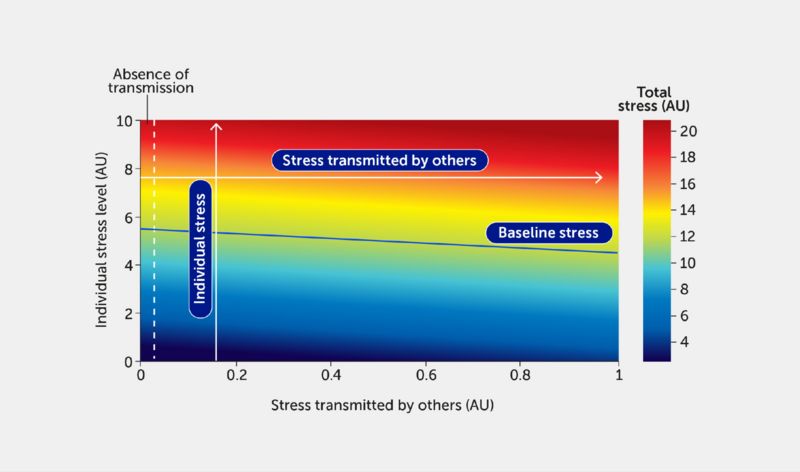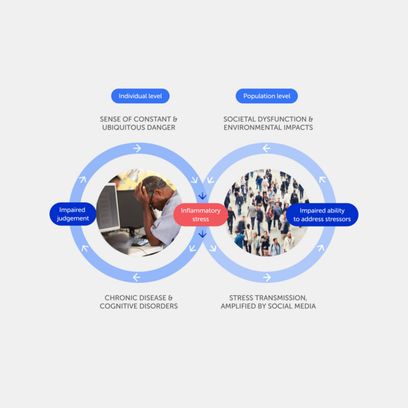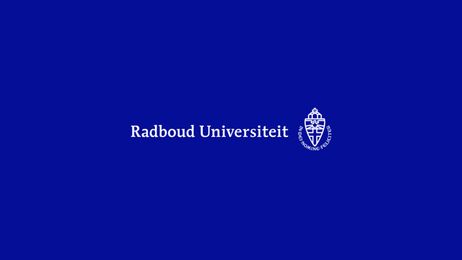
Frontiers in Science Lead Article
Published on 12 Mar 2024
A multiscale inflammatory map: linking individual stress to societal dysfunction
- 67,233 views
- 21 citations


Frontiers in Science Lead Article
Published on 12 Mar 2024

At a virtual symposium on 9 April 2024, the lead article authors delved into links among stress, inflammation, mental state, and behavior, and why these are vitally important to human and planetary health.

Prof David M. Almeida, of The Pennsylvania State University, USA, highlights a significant increase in day-to-day stress among midlife adults and presents three steps toward better understanding and addressing stress at individual and population levels.

Prof Pietro Ghezzi, of the University of Urbino Carlo Bo, Italy, explores how Vodovotz et al.’s mathematical model could investigate how inflammation may represent a link between socioeconomic status and health conditions.

Prof Ioannis P. Androulakis of Rutgers, The State University of New Jersey, USA, discusses the evolving concept of stress and the potential of mathematical models to improve understanding of the interface between stress, inflammation, and disease.
Understanding the links among stress, inflammation, mental state, and behavior is vitally important to human and planetary health.
According to our hypothesis, inflammation acts as a multiscale driver connecting stressors that affect individuals to large-scale societal dysfunction and ultimately to planetary-scale impacts on the environment, which in turn drive inflammatory stress via a positive feedback loop.
We propose a “central inflammation map” hypothesis to explain how the brain regulates inflammation and how inflammation impairs perception, emotion, cognition, consciousness, and behavior.
The interdependent inflammatory and neural processes, and the inter-individual transmission of environmental and infectious stressors—amplified via high-throughput digital global communications—culminate in a multiscale, runaway, feed-forward process that could detrimentally affect human decision-making and behavior at scale, ultimately impairing our ability to address these same stressors at both the individual and population levels.
We propose a mathematical model that can be used to elucidate and test the links between stress, inflammation, neural control/cognition, and healing, with resultant implications on stress transmission, possible intervention (e.g., via lifestyle modification or medication), and resilience.
A coordinated, interdisciplinary, international research effort is needed to define interventions that would improve the lives of individuals and the resilience of communities to stress—involving multilayered, multiscale stress mitigation interventions covering lifestyle measures, precision therapeutics, and human ecosystem design.

A summary of the lead article by Vodovotz et al. in a Q&A format, with infographics and a video.

A version of the lead article written for—and peer reviewed by—kids aged 8-15 years.

Scientists hypothesize that as-yet unrecognized inflammatory stress is spreading among people at unprecedented rates, affecting our cognitive ability to address climate change, war, and other critical issues.

Scientists, including Paul Verschure at Radboud University, hypothesize that as-yet unrecognized inflammatory stress is spreading among people at unprecedented rates and affecting our cognitive ability to address climate change, war, and other critical issues.

In a time of unprecedented global challenges, from geopolitical instability to the ongoing Covid-19 pandemic, a new concern has emerged – chronic inflammation. A recent international study, published in Frontiers in Science, has highlighted the potential negative implications of chronic inflammation on health and society as a whole.

Researchers propose a new map of mental stress that may explain why it's so hard to confront society's big crises.

Scientists have proposed that as-yet unrecognised inflammatory stress is spreading in populations at unprecedented rates, fueled in part by "runaway" digital communication and anxiety over global crises.
Follow the science, follow Frontiers in Science